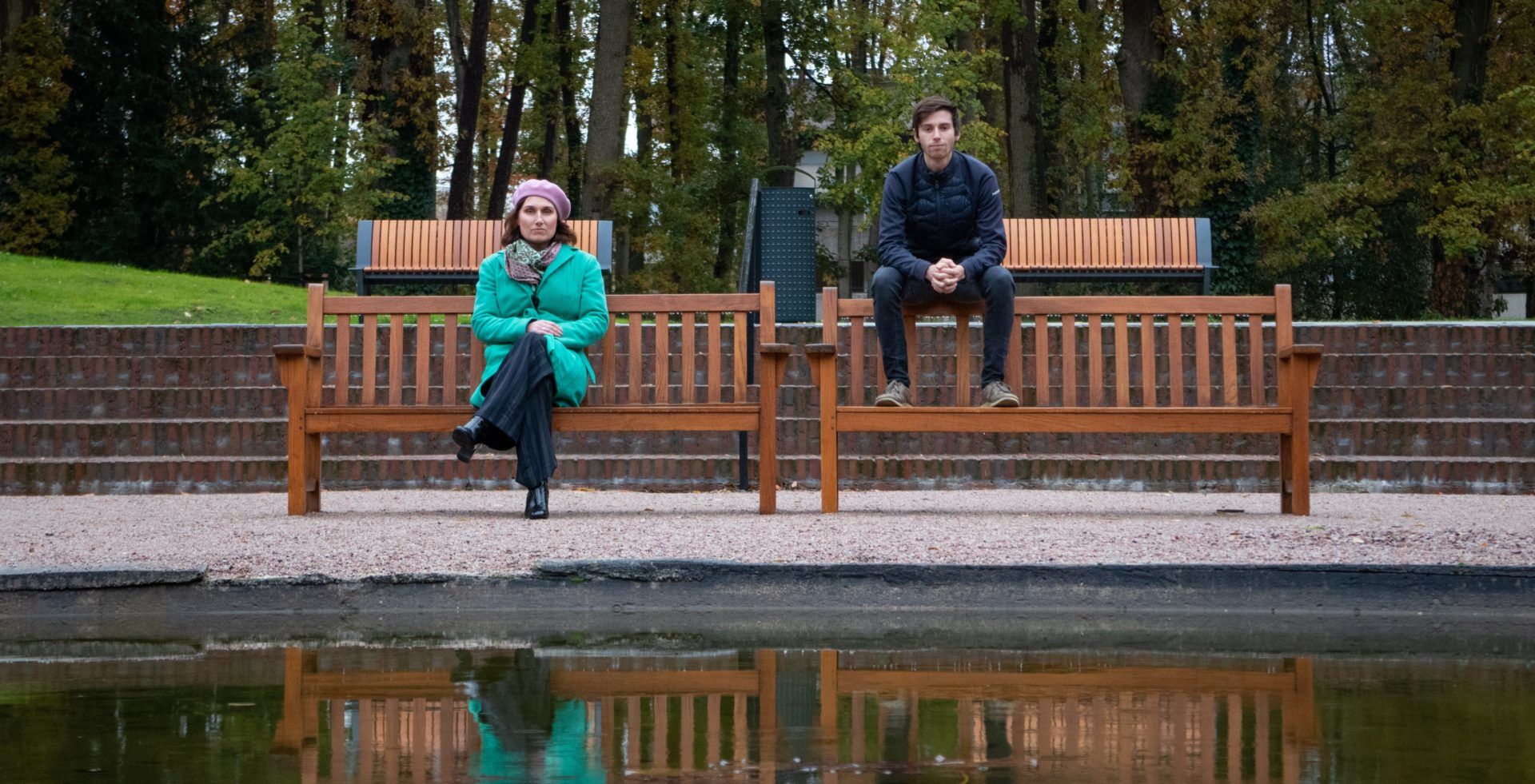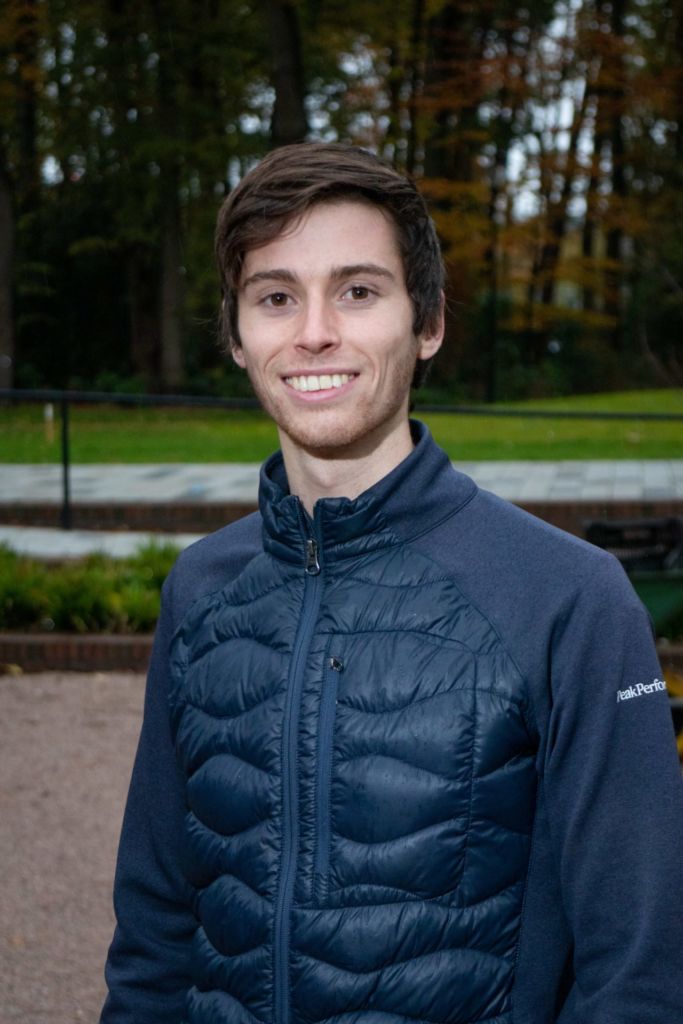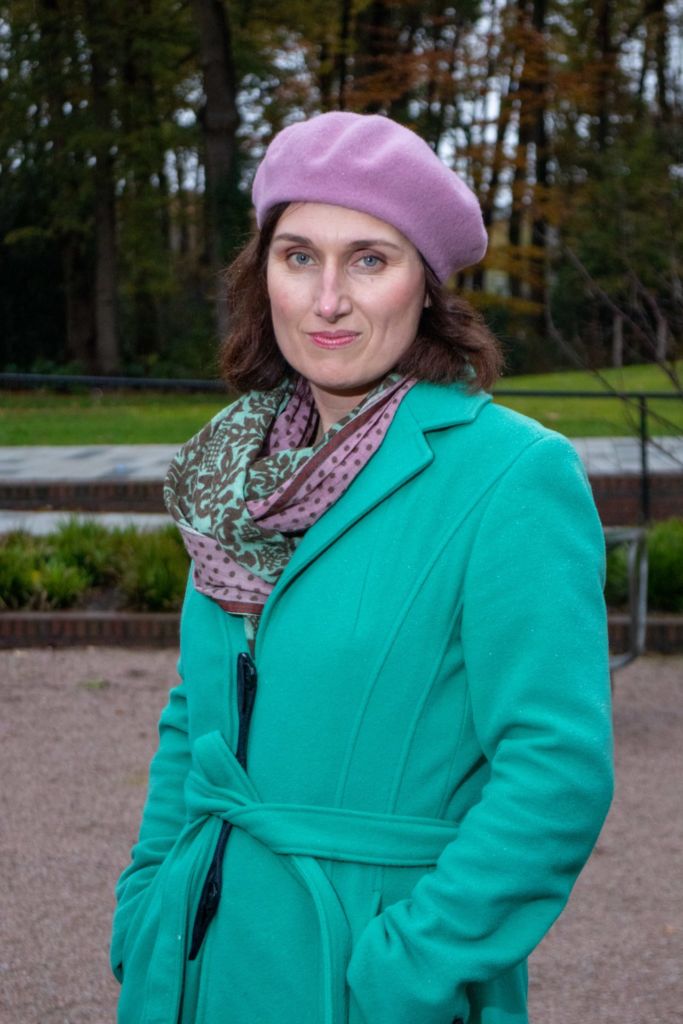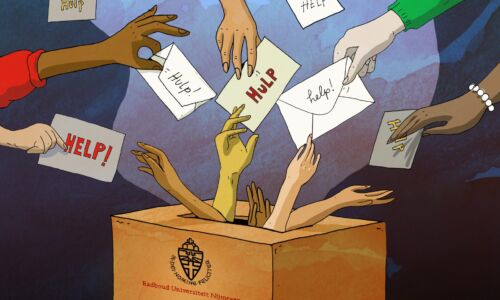‘We should be more open about what we encounter’
-
 Inge Bleijenbergh andTies van der Stappen. Photo: Rein Wieringa
Inge Bleijenbergh andTies van der Stappen. Photo: Rein Wieringa
Sexually suggestive compliments, embarrassing questions posed to a woman wearing a headscarf and off-colour remarks from students about lecturers with whom they ‘would like to go to bed’. According to student Ties van der Stappen and associate professor Inge Bleijenbergh, there is substantial room for improvement with regard to social safety at the university. A double interview.
Since the rise of the #MeToo movement, social safety at the university has been in the spotlight. It has become clear that there is much work to do. Studies. by the FNV [Federation of Dutch Trade Unions] and VAWO [Academic Union] have exposed practices including abuse of power by professors. The Dutch Network of Women Professors has written about ‘academic sabotage’ against women, and a survey of staff members at Radboud University has revealed that 14% of those surveyed had encountered undesirable behaviour in the workplace.
In response to these developments, the university’s Executive Board would like to increase the accessibility of confidential advisors. In the opinion of Inge Bleijenbergh, a member of the Works Council, and Ties van der Stappen, a member of the University Student Council, this is far from sufficient. During the previous joint meeting with the Executive Board, they shared their own experiences and called for prevention.

What exactly is social safety?
Ties van der Stappen (TvdS): ‘My friends asked me that as well when I told them about this interview. In short, social safety means that all people feel safe and comfortable within their own social contexts. That’s still quite vague, isn’t it?’
What would be an example of a socially unsafe situation?
TvdS: ‘Examples include power relations in which a supervisor exercises influence over a PhD candidate, jokes that make people uncomfortable and discrimination. What do you think, Inge?’
Inge Bleijenbergh (IB): ‘That sounds like a good description to me. In my opinion, such power relations play out between lecturers and students. I would describe it this way: social safety means that people are completely free to be who they want to be’.
Which examples have you shared with the Executive Board?
IB: ‘Before I start with the examples, let me make one comment. I am sharing these experiences because I am convinced that we should be more open about what we encounter, not because I think that this is the worst thing one could possibly encounter. On the contrary: as a board member of the Halkes Women Faculty Network I have heard all sorts of stories, ranging from sexist remarks in meetings to forced sex. Things could thus be much worse. We would like other people to know that they are not the only ones to encounter these things, and we hope that our experiences will help to create new policies.
‘The first example: I was on the train with three senior male colleagues, on the way back from a conference. The atmosphere was playful, and one of my colleagues said that he would not mind sharing a bed with me during the conference. I was taken aback and was still smiling at previous jokes, and I didn’t say anything about it. Neither did the other colleagues. After about a half minute of awkward silence, we started talking about something else’.
‘Lecturers are being described as MILF.’
‘The next example: I was walking in the corridor, when a colleague complimented me on my clothing. It was rather detailed, and I tried to redirect the attention to him by saying, “Your shirt is also nice”. His response was, “Yeah, but I don’t have such a nice body under it”. I was perplexed. I was already feeling uncomfortable, but once the conversation turned to my body, I didn’t know what to say next. I just ignored the remark and walked away. Now, every time I receive a compliment, I can’t help thinking, “Where is this going?”’
‘Another example: I was giving a lecture and noticed that a PhD candidate in the front row was staring at my breasts. He just kept on looking, and I started to feel uncomfortable. After some time, I announced a break and went to my office to put on a jacket over my sweater’.
TvdS: ‘Nothing like that has ever happened to me, fortunately, but I sometimes hear other people talking about it. For example, another member of the University Student Council was in a lecture given in Dutch where a girl in a headscarf was also in attendance. When the lecturer saw her, he asked, “Does everyone here understand Dutch? If not, we can continue in English”. He tried to save the situation by saying that he asked because of her foreign appearance, but that obviously did not make things better. Although he most probably meant no harm, it must have been very awkward for both the girl and the lecturer’.
‘Another example: After lectures, I sometimes hear students judging lecturers on their appearance. Although these remarks are usually in jest, they can also be inappropriate. A student will sometimes describe a lecturer as a “MILF” (“Mother I would like to fuck”, ed.), and students occasionally say that they’d like to sleep with the lecturer’.
How do you react to such remarks?
TvdS: ‘That’s very awkward for me. Sometimes I say something about it, but other times I don’t. The problem is that, because the remark is intended as a joke, I feel guilty for saying something about it. No one wants to be a party pooper. We have to be able to take a joke, but there are limits’.
Where are those limits?
TvdS: ‘It differs according to the person and the situation. If it’s truly discriminatory, people understand that it’s inappropriate. Although it’s not necessarily discriminatory to call a lecturer a MILF, such terms are never used for men’.

IB: ‘If you want to make jokes about homosexuals, do it if you’re gay yourself. Leave jokes about women to women, and jokes about people from Suriname are best told by those who are also from Suriname. But if you’re white, please don’t make jokes about people from Suriname. You’re part of a majority, and you don’t know how many jokes someone might already have had to endure. It’s usually more than you think’.
TvdS: ‘That seems tricky to me, because it draws a distinction between people. People in the majority might think, “If minorities can make those jokes, why can’t we?” Do you see what I’m saying?’
IB: ‘I get it, but the perspective of the majority is not so frequently the object of ridicule. This is why self-deprecating jokes take priority for me’.
What do your experiences tell us about social safety at Radboud University?
IB: ‘I don’t think that the problems here are any worse than at other universities. We nevertheless do have to acknowledge that all of this is happening here as well, from intimidating situations to forced sex’.
Is the university socially unsafe?
TvdS: ‘I wouldn’t say that. I think that, in general, most people feel at ease. That does not mean, however, that there aren’t any problems’.
IB: ‘There’s definitely room for improvement. During the meeting, I was very happy when Wilma de Koning (Vice-President of the Executive Board, ed.) said that any time social safety is lacking is once too many. This is how it should be seen’.
Where does this problem actually come from?
TvdS: ‘There always have been and always will be situations in which social safety is lacking. This can never be completely resolved, but opening it to discussion can ensure that the problems are charted. I think that, although social media have helped to draw attention to such things, the fact that these channels also allow a place for extreme expression is actually exacerbating the problems’.
What needs to happen at the university?
IB: ‘The university is already working to increase the accessibility of confidential advisors. Studies have indicated that people do not always find their way to this resource. Reams of paper have been devoted to how staff members should behave, but we need to devote more effort to prevention.
For example, role-play exercises are already being used at the university to teach supervisors how to cope with situations like those in our examples. We would like for such training to be available to all staff members and students. Once people have practised these situations, they will react differently in real life’.
TvdS: ‘I think that the first step should be to develop a plan for social safety amongst students as soon as possible. In addition, we need an awareness-raising campaign. It is very important for such matters to be open to discussion. Fortunately, the Executive Board has said that they intend to work on this’.
Why are confidential advisors not sufficient?
IB: ‘Because they are not involved until something has happened. Confidential advisors are perfect when things have gotten out of hand, but we would also like for it not to reach that point’.
Ties van der Stappen is a fifth-year student of political science and history, in addition to representing the AKKUraatd party in the University Student Council. In this interview, he spoke in a personal capacity.
Inge Bleijenbergh is an associate professor in the Nijmegen School of Management. She conducts research on gender and diversity in organisations, and she represents VAWO [Academic Union] in the Works Council. She was a co-founder of the Halkes Women Faculty Network, where she served on the board for seven years.



